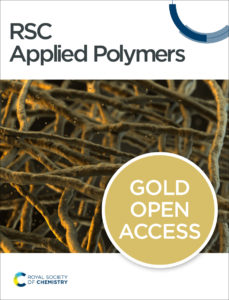To celebrate the growth and development of the RSC Applied Polymers community and to highlight the remarkable authors who continue to contribute their high quality work to the journal we would like to share the opinions and insights of these authors through this introductory blog post. Once dubbed #RSCAppliedfirst50, our blog posts aim to give a voice to the authors behind the research and hope that their insights might shed light upon growing challenges and progress in polymer science and its applications.
In this edition, we hear from Rebecca Johnson and Ariel Tolfree, about their study entitled ‘3D Printable Polymer Foams with Tunable Expansion and Mechanical Properties Enabled by Catalyst-Free Dynamic Covalent Chemistry’
Hear from our authors: Rebecca M. Johnson and Ariel R. Tolfree
An introduction to ‘3D Printable Polymer Foams with Tunable Expansion and Mechanical Properties Enabled by Catalyst-Free Dynamic Covalent Chemistry’ by Rebecca Johnson and Ariel Tolfree
Thermoset foams are everywhere—from cushioning materials to high-performance insulation—but their processing methods make shaping them into complex designs a challenge. 3D printing has emerged as a powerful solution, allowing for the fabrication of intricate, customizable architectures that can expand on demand through a post-processing thermal treatment. However, traditional foams face a trade-off: increasing crosslinking improves mechanical strength but limits expansion, while reducing crosslinking allows for more expansion but weakens the material.
Our recent work overcomes this limitation by incorporating dynamic phosphodiester bonds into 3D-printed polymers embedded with closed-cell foaming microspheres. These dynamic bonds enhance the foaming process, enabling greater expansion without sacrificing structural integrity. The result? Stronger, more resilient foams with improved energy dissipation and durability. Not only do these materials perform effectively both before and after foaming, but they also offer a sustainable advantage—their dynamic nature makes them recyclable and reusable across multiple lifecycles.
Looking ahead, we’re exploring bio-based alternatives to further improve sustainability and conducting deeper studies on how the polymer network influences foam behaviour. By pushing the boundaries of 3D-printed thermoset foams, we aim to unlock new possibilities for high-performance, adaptable materials.
Rebecca M. Johnson

Rebecca Johnson
Rebecca Johnson is a Ph.D. candidate in the Smaldone Lab at the University of Texas at Dallas. Her research focuses on advanced materials for 3D printing, incorporating dynamic covalent chemistry (DCC) to develop recyclable, reprocessable, and high-performance polymer systems. She explores polymer composites, thermally expandable foams, MOF-polymer composites, bio-based resins, and porous polymer fabrication methods such as polymerization-induced phase separation (PIPS) and polymerized high internal phase emulsions (polyHIPEs).
Ariel R. Tolfree

Ariel Tolfree
Ariel Tolfree is a Ph.D. student in the Smaldone Lab at the University of Texas at Dallas. Her research focuses on advanced polymer systems for 3D printing, emphasizing improved material performance, isotropy, and functionality. She investigates the role of dynamic covalent chemistry (DCC) in enabling smart materials, such as mechanophores, for damage detection and self-healing, while also developing thermally expandable foams for lightweight, high-performance structures. Her work focuses on thermoset systems, combining polymer chemistry with additive manufacturing techniques.
‘3D Printable Polymer Foams with Tunable Expansion and Mechanical Properties Enabled by Catalyst-Free Dynamic Covalent Chemistry’
RSC Appl. Polym., 2025, Advance Article. DOI: 10.1039/D4LP00374H
 |
RSC Applied Polymers is a leading international journal for the application of polymers, including experimental and computational studies on both natural and synthetic systems. In this journal, you can discover cross-disciplinary scientific research that leverages polymeric materials in a range of applications. This includes high impact advances made possible with polymers across materials, biology, energy applications and beyond.
|



